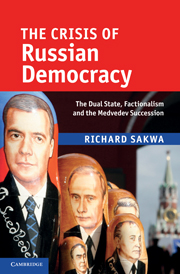Book contents
- Frontmatter
- Contents
- List of tables
- Preface
- Acknowledgements
- Note on transliteration
- 1 The dual state in Russia
- 2 Succession struggles and electoral contests
- 3 Political power and factionalism
- 4 A genuinely political economy
- 5 Managed succession
- 6 War of the Putin succession
- 7 Duma selection
- 8 Presidential succession
- 9 Medvedev's challenge
- 10 Conclusion: transcending the dual state
- Bibliography
- Index
7 - Duma selection
Published online by Cambridge University Press: 05 June 2012
- Frontmatter
- Contents
- List of tables
- Preface
- Acknowledgements
- Note on transliteration
- 1 The dual state in Russia
- 2 Succession struggles and electoral contests
- 3 Political power and factionalism
- 4 A genuinely political economy
- 5 Managed succession
- 6 War of the Putin succession
- 7 Duma selection
- 8 Presidential succession
- 9 Medvedev's challenge
- 10 Conclusion: transcending the dual state
- Bibliography
- Index
Summary
All Russian parliamentary elections, apart from the first in December 1993, were overshadowed by the even greater prize of the presidency. The presidential succession and the parliamentary election campaign are organically interlinked. Traditionally, Duma elections acted as a type of primary for the later presidential poll, acting as a filter for potential presidential candidates. The relatively poor performance of his Fatherland-All Russia (OVR) electoral bloc in December 1999 forced Primakov to withdraw from the succeeding presidential campaign. In the 2003–4 electoral cycle, however, Putin's overwhelming predominance meant that no serious alternatives to his candidacy emerged, and the primary element declined. By 2007 the Duma election of 2 December did not serve in any real sense as a ‘primary’ (since the identities of the possible presidential candidates were unknown), but it was turned by Putin into a ‘referendum’ on his rule to give him authority to shape politics after his term in office expired. Although factionalised internally, the regime placed a high premium on the concept of ‘loyalty’ from officialdom and the public, with defectors quickly being tarred with the ‘dissident’ brush while supporters were demonstratively to display their conformity. The neo-Soviet mentality was still reflected in electoral practices.
The normative framework
Although the presidential administration managed the electoral process, there remained a number of unresolved issues. It was unclear how many parties would be represented in the Duma and which would be filtered out.
- Type
- Chapter
- Information
- The Crisis of Russian DemocracyThe Dual State, Factionalism and the Medvedev Succession, pp. 210 - 262Publisher: Cambridge University PressPrint publication year: 2010



